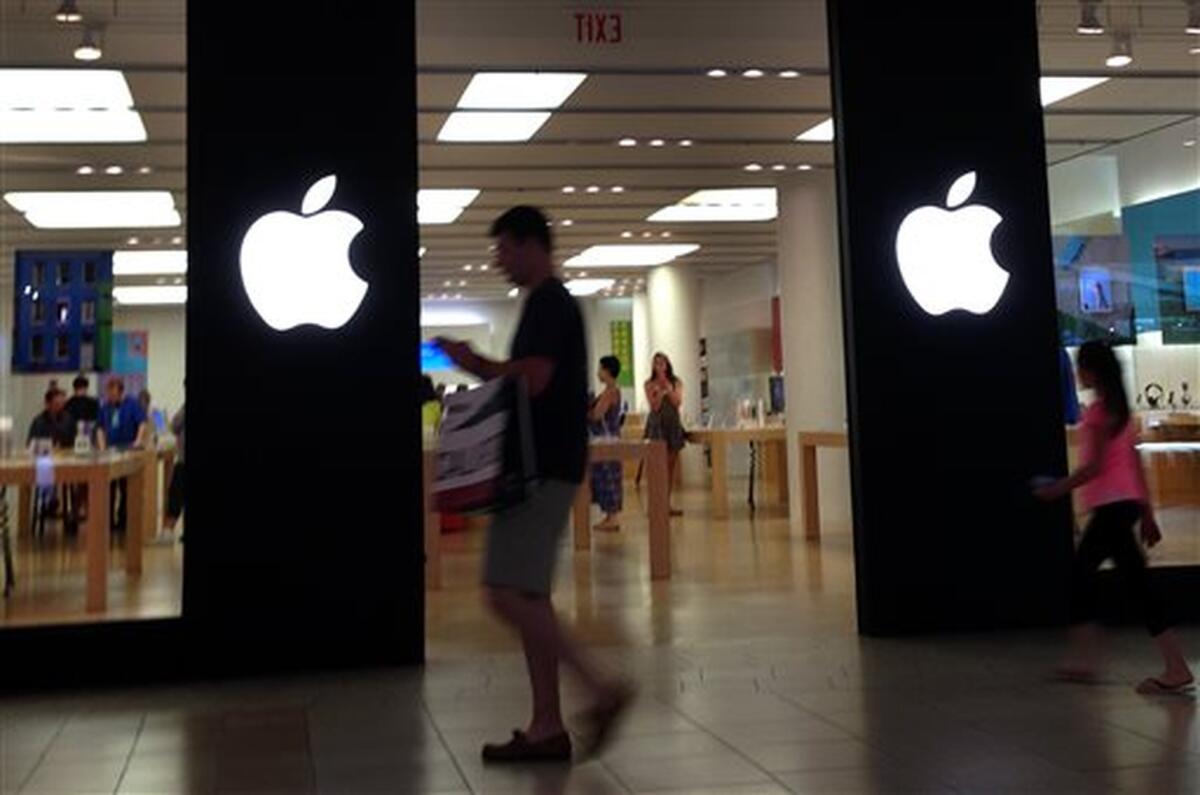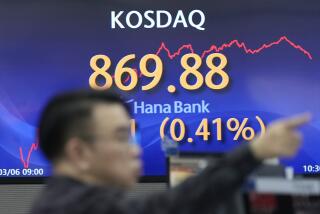Apple shares are falling as iPhone sales become a cause for concern

Sales of the Apple iPhone 6S may haven’t been as brisk as expected to close 2015, analysts fear.
The last time that Apple Inc. shares nose-dived, investors were worried about the company’s overexposure to a slowing Chinese economy last summer.
Now the technology giant’s stock is plunging again — this time over fears about poor iPhone sales, not just in China but across the globe.
Shares of the world’s most valuable company have fallen nearly 15% over the last month, briefly trading Wednesday below $100 for the first time since October 2014, amid several reports that iPhone part makers and assemblers are bracing for a work slowdown.
Apple isn’t commenting on iPhone sales, but financial analysts said the company’s trimming orders to its Asian suppliers suggests that the iPhone 6S hasn’t sold as well as expected.
Join the conversation on Facebook >>
That dovetails with recent research from Morgan Stanley analyst Katy Huberty, who predicted an annual sales decline in Apple’s most popular product for the first time in 2016.
Wall Street “was bracing for a cut but the magnitude here is a bit more worrisome and speaks to a soft March quarter on the horizon,” said Daniel Ives of FBR Capital Markets.
The specter of sagging iPhone sales underscores the growing uncertainty rippling across the global economy now that China, one of its chief drivers, appears to be running low on steam.
That’s bad news for big corporations like Apple, which is betting on sustained, massive growth in the world’s second-largest economy to secure fresh profits.
Few companies have reaped more reward from China’s economic rise than Apple. Since the company released the iPhone there seven years ago, China’s economy has doubled in size to more than $10 trillion, fueling a consumer market that is responsible for more than a quarter of Apple’s total revenue today.
“Apple’s exposure to China is huge relative to most big companies,” said Andy Hargreaves, an analyst for Pacific Crest Securities. “They’ve been extraordinarily successful there. So yes, what happens in China is hugely important, especially if it affects consumer spending.”
Financial markets went into a tailspin Monday after reports surfaced that China’s manufacturing sector worsened last month.
Several media agencies, including Nikkei in Japan, reported Tuesday that primary iPhone assembly giant Foxconn Technology Group plans to dial back work in China during next month’s Lunar New Year celebration. The Wall Street Journal reported that Foxconn sent some workers home on vacation early, unusual compared to recent years.
Foxconn denied the assertion, saying that vacation “did not begin in December 2015 for our employees” and that it was still “in the midst of planning operational schedules for the Lunar New Year holiday.”
Apple’s battering began in mid-December, when companies that produce casings and internal components for iPhones, including Jabil Circuit and Dialog Semiconductor, reported lower-than-expected revenue forecasts. In recent days, iPhone concerns seem to have weighed on investors, who pulled out of other companies in Apple’s supply chain.
Some analysts don’t think that the decreased demand can be pinned solely on China, which is slowly transitioning out of an export-driven economy into one in which consumer goods and services play a far bigger role.
The country’s middle class continues to expand, putting smartphones increasingly within reach for consumers.
“The kind of people who buy iPhones are likely to be fairly resistant to macroeconomic trends in China,” said Jan Dawson of technology consulting firm Jackdaw Research.
Last August, Apple Chief Executive Tim Cook tried to reassure investors, saying Apple remains optimistic about China as it plans to double its number of stores in the country by next year.
“I continue to believe that China represents an unprecedented opportunity over the long term,” Cook told CNBC host Jim Cramer at a time when Apple’s stock took a hit over poor Chinese economic news.
That’s important because Europe, the U.S. and other Western markets are tapped out: People who want an iPhone probably already have some version of the device.
Cook has not commented yet on the current situation.
That’s why Apple’s revenue is likely to grow more slowly than in recent years, and why quarterly iPhone sales could decline for the first time ever compared with a year earlier when Apple reports October through December results this month.
The 2014 holiday quarter was record-breaking for Apple, with 74 million iPhones sold as consumers rushed to buy the iPhone 6 and its significantly larger screen size.
Analysts knew that the number couldn’t be repeated in 2015 because there was no similar historic hardware change in the iPhone 6S, said Ryan Reith, a program director at research firm IDC. He estimated that 70 million iPhones were sold over the last three months.
Growth will slow in 2016, he predicted, though it will remain significant at a rate of about 5% for full-year sales. It will come from Apple pushing early upgrades, potential introduction of a more affordable version of the iPhone 6 and the forthcoming iPhone 7.
SIGN UP for the free California Inc. business newsletter >>
Even if iPhone sales fall or are flat in the upcoming financial results, strong holiday sales of other products should have created overall revenue growth for Apple. The Apple Watch appeared to be top gift choice, Dawson said.
The recently launched iPad Pro, with a larger screen than traditional iPads, has been met with positive reviews. And the new Apple TV box has been off to a “decent start,” he said.
Still, the iPhone remains Apple’s profit engine and the primary item that investors monitor.
“The problem with Apple is that it’s a risky bet because it’s hung on one product with an annual release cycle,” Dawson said. “Any time there’s extra uncertainty, like right now, that adds to the existing overall worry about the stability of Apple’s business.”
On Wednesday, Apple shares closed at $100.70, down $2.01, or nearly 2%. The shares traded above $119 just over a month ago.
Apple will report its holiday-quarter earnings Jan. 26, though it offered a tease Wednesday. The company announced a record $1.1 billion in sales of App Store apps and in-app data in the two weeks that ended Sunday. It included the biggest day of sales since the App Store launched in 2008, with $144 million of app-related purchases on New Year’s Day. Apple used different measurements in announcing similar milestones a year ago, making comparison difficult.
Twitter: @peard33
Twitter: @dhpierson
ALSO
Carmakers show off tech innovations at CES
Is the NFL coming to L.A.? Here are the latest answers
Macy’s to slash 4,800 jobs and close 40 stores after disappointing holidays








